反义疑问句
反义疑问句例句20个
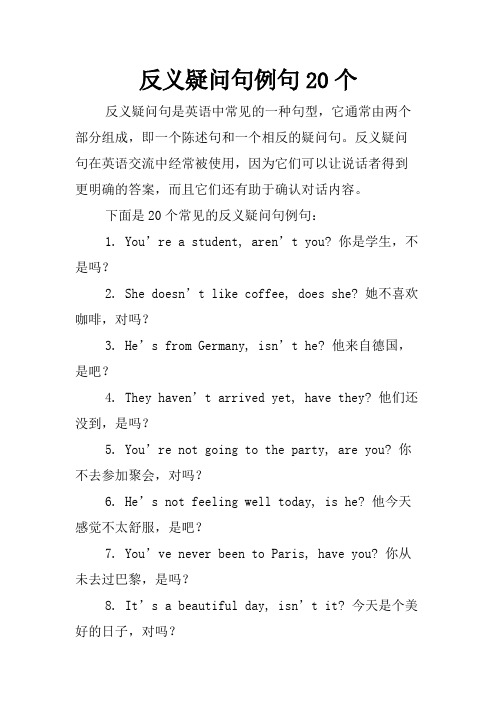
反义疑问句例句20个反义疑问句是英语中常见的一种句型,它通常由两个部分组成,即一个陈述句和一个相反的疑问句。
反义疑问句在英语交流中经常被使用,因为它们可以让说话者得到更明确的答案,而且它们还有助于确认对话内容。
下面是20个常见的反义疑问句例句:1. You’re a student, aren’t you? 你是学生,不是吗?2. She doesn’t like coffee, does she? 她不喜欢咖啡,对吗?3. He’s from Germany, isn’t he? 他来自德国,是吧?4. They haven’t arrived yet, have they? 他们还没到,是吗?5. You’re not going to the party, are you? 你不去参加聚会,对吗?6. He’s not feeling well today, is he? 他今天感觉不太舒服,是吧?7. You’ve never been to Paris, have you? 你从未去过巴黎,是吗?8. It’s a beautiful day, isn’t it? 今天是个美好的日子,对吗?9. He can’t swim, can he? 他不会游泳,对吗?10. She doesn’t like pizza, does she? 她不喜欢披萨,对吗?11. You’re not afraid of heights, are you? 你不怕高,对吗?12. They won’t be able to attend the meeting, will they? 他们不能参加会议,对吗?13. They’re leaving tomorrow, aren’t they? 他们明天要走了,对吗?14. He’s never been skiing, has he? 他从未滑过雪,对吗?15. She’s not going to the concert, is she? 她不去音乐会,对吗?16. You’re not worried about the exam, are you? 你不担心考试吧,对吗?17. He didn’t eat breakfast this morning, did he? 他今天早上没吃早餐,对吗?18. They’r e not going to the beach, are they? 他们不去海边,对吗?19. You’ve already seen the movie, haven’t you? 你已经看过这部电影了,对吗?20. He’s not coming to the party, is he? 他不来参加聚会,对吗?在使用反义疑问句时,需要注意的是,它们并不总是表示对话者的不确定或疑虑。
什么是反意疑问句
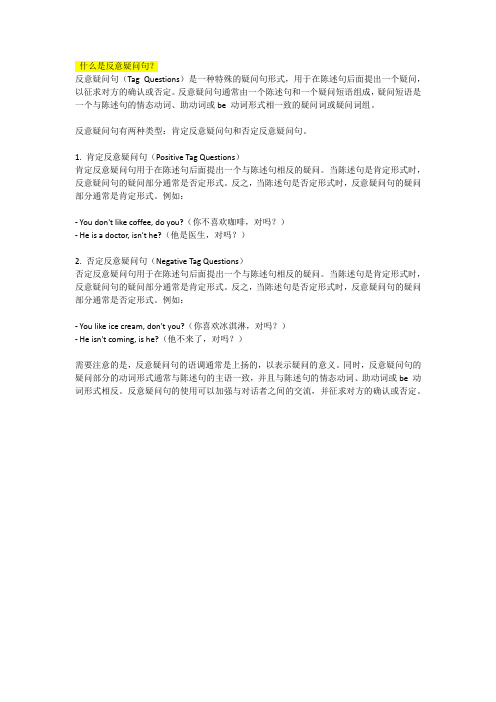
什么是反意疑问句?反意疑问句(Tag Questions)是一种特殊的疑问句形式,用于在陈述句后面提出一个疑问,以征求对方的确认或否定。
反意疑问句通常由一个陈述句和一个疑问短语组成,疑问短语是一个与陈述句的情态动词、助动词或be 动词形式相一致的疑问词或疑问词组。
反意疑问句有两种类型:肯定反意疑问句和否定反意疑问句。
1. 肯定反意疑问句(Positive Tag Questions)肯定反意疑问句用于在陈述句后面提出一个与陈述句相反的疑问。
当陈述句是肯定形式时,反意疑问句的疑问部分通常是否定形式。
反之,当陈述句是否定形式时,反意疑问句的疑问部分通常是肯定形式。
例如:- You don't like coffee, do you?(你不喜欢咖啡,对吗?)- He is a doctor, isn't he?(他是医生,对吗?)2. 否定反意疑问句(Negative Tag Questions)否定反意疑问句用于在陈述句后面提出一个与陈述句相反的疑问。
当陈述句是肯定形式时,反意疑问句的疑问部分通常是肯定形式。
反之,当陈述句是否定形式时,反意疑问句的疑问部分通常是否定形式。
例如:- You like ice cream, don't you?(你喜欢冰淇淋,对吗?)- He isn't coming, is he?(他不来了,对吗?)需要注意的是,反意疑问句的语调通常是上扬的,以表示疑问的意义。
同时,反意疑问句的疑问部分的动词形式通常与陈述句的主语一致,并且与陈述句的情态动词、助动词或be 动词形式相反。
反意疑问句的使用可以加强与对话者之间的交流,并征求对方的确认或否定。
反义疑问句的14种常考特殊用法
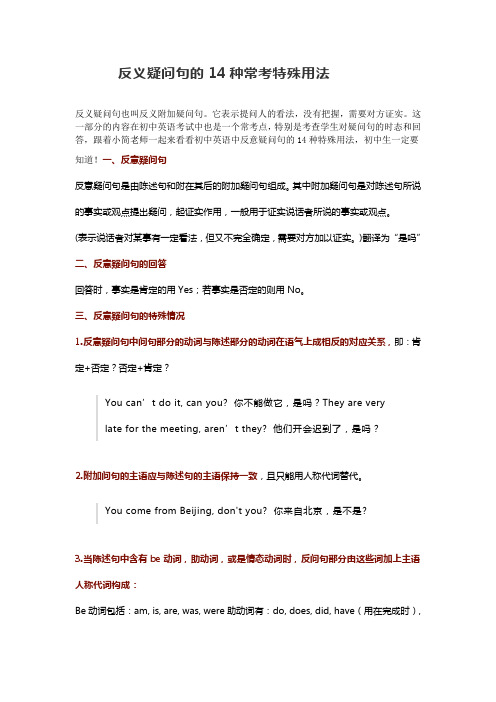
反义疑问句的14种常考特殊用法反义疑问句也叫反义附加疑问句。
它表示提问人的看法,没有把握,需要对方证实。
这一部分的内容在初中英语考试中也是一个常考点,特别是考查学生对疑问句的时态和回答,跟着小简老师一起来看看初中英语中反意疑问句的14种特殊用法,初中生一定要知道!一、反意疑问句反意疑问句是由陈述句和附在其后的附加疑问句组成。
其中附加疑问句是对陈述句所说的事实或观点提出疑问,起证实作用,一般用于证实说话者所说的事实或观点。
(表示说话者对某事有一定看法,但又不完全确定,需要对方加以证实。
)翻译为“是吗”二、反意疑问句的回答回答时,事实是肯定的用Yes;若事实是否定的则用No。
三、反意疑问句的特殊情况1.反意疑问句中问句部分的动词与陈述部分的动词在语气上成相反的对应关系,即:肯定+否定?否定+肯定?You can’t do it, can you? 你不能做它,是吗?They are verylate for the meeting, aren’t they? 他们开会迟到了,是吗?2.附加问句的主语应与陈述句的主语保持一致,且只能用人称代词替代。
You come from Beijing, don't you? 你来自北京,是不是?3.当陈述句中含有be动词,助动词,或是情态动词时,反问句部分由这些词加上主语人称代词构成:Be动词包括:am, is, are, was, were助动词有:do, does, did, have(用在完成时),has(用在完成时)等情态动词有:can, could, may, might, must, will, would, shall, shouldHe will go home, won’t he? 他要回家了,是吗?She doesn’tlike to eat popcorn, does she? 她不喜欢吃爆米花,是吗?4.have的不同用法,反义疑问句用不同的动词(1)have 表“有”时,反义疑问句谓语动词用have/do都行He has a new car, doesn’t/hasn’t he?(2)have表“吃,喝,玩,度过,举办”等是,反义疑问句谓语动词用doHe has supper at home every day, doesn’t he?They had agood time in Beijing, didn’t they?(3)have to表“不得不,必须”时,反义疑问句谓语动词用doKite has to help her mother, doesn’t she?(4)had better表“最好”时,反义疑问句谓语动词用hadWe had better go to school at once, hadn't we?(5)have用在完成时中,反义疑问句谓语动词用haveThey have known the matter, haven’t they?5.(1)反意疑问句的陈述部分带有little, few, never, hardly, seldom,nobody, nothing, no one, none, neither等否定意义的词时,问句部分用肯定式。
反义疑问句超详细讲解!!!
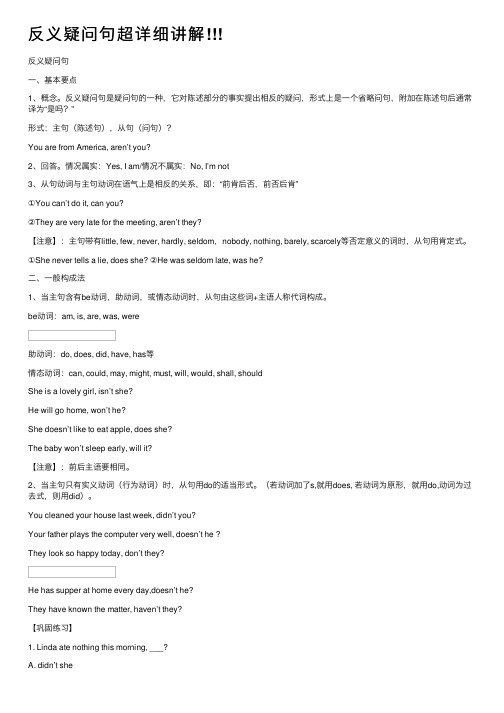
反义疑问句超详细讲解反义疑问句⼀、基本要点1、概念。
反义疑问句是疑问句的⼀种,它对陈述部分的事实提出相反的疑问,形式上是⼀个省略问句,附加在陈述句后通常译为“是吗?”形式:主句(陈述句),从句(问句)?You are from America, aren’t you?2、回答。
情况属实:Yes, I am/情况不属实:No, I’m not3、从句动词与主句动词在语⽓上是相反的关系,即:“前肯后否,前否后肯”①You can’t do it, can you?②They are very late for the meeting, aren’t they?【注意】:主句带有little, few, never, hardly, seldom,nobody, nothing, barely, scarcely等否定意义的词时,从句⽤肯定式。
①She never tells a lie, does she? ②He was seldom late, was he?⼆、⼀般构成法1、当主句含有be动词,助动词,或情态动词时,从句由这些词+主语⼈称代词构成。
be动词:am, is, are, was, were助动词:do, does, did, have, has等情态动词:can, could, may, might, must, will, would, shall, shouldShe is a lovely girl, isn’t she?He will go home, won’t he?She doesn’t like to eat apple, does she?The baby won’t sleep early, will it?【注意】:前后主语要相同。
2、当主句只有实义动词(⾏为动词)时,从句⽤do的适当形式。
(若动词加了s,就⽤does, 若动词为原形,就⽤do,动词为过去式,则⽤did)。
反义疑问句知识点

反义疑问句反义疑问句:在陈述句后附加一个简短的疑问句,可以表示疑问,也可以表示说话者的某种倾向,强调或反问。
反义疑问句通常由两个词组成:第一个词是be、情态动词、助动词;若为否定,not用简略形式。
第二个词是人称代词主格(与陈述句主语相同)。
例:……,can't we? 和……,can we?⑴一般情况下:前面陈述句是肯定句,后面反义疑问句部分用否定;即“前肯定后否定,前否定后肯定”。
⑵当陈述句部分有表示否定或部分否定意义的词如little,barely,hardly,rarely,scarcely,seldom,few,no,never,nothing,not等词时,反意疑问句部分要用肯定形式。
You can hardly blame Tom for leaving early, can you?你不能责怪汤姆提前离开,是吗?当陈述句部分中表示否定意义的词为含有im-,in-,dis-,un-等否定前缀或-less等否定后缀的词时,应把陈述句部分视为肯定句,反意疑问句部分要用否定形式。
(有否定意义,但不能算否定词)Tom dislikes the book,doesn't he? 汤姆不喜欢这本书,是吗?⑶陈述句主语不同情况①当陈述句部分的主语是everyone,someone,anyone,no one,everybody,somebody,anybody,nobody等表示人的不定代词时,反意疑问句部分的主语通常用he,但口语多用they;Nobody wants to go here,does he/do they?没有人想去那里,是不是?②当陈述句部分的主语是anything,everything,nothing,something 等表示物的不定代词时,反意疑问句部分的主语常用it.Everying seems all right now,doesn't it?似乎一切顺利,是不是?②当陈述句部分的主语是I 时,反意疑问句部分的主语常用aren't I.若表示征询对方意见时,疑问句部分用do you.I am healthy,aren't I?我很健康,对吗?I don't like this film,do you?我不喜欢这部电影,你呢?④当陈述句部分的主语是不定式(短语)或动名词(短语)时,反意疑问句部分的主语常用it.Learning English well takes a long time,doesn't it?学好英语需要好长时间,是不是?②当陈述部分的主语是指示代词this /that或these /those时,疑问句中的主语分别用it或theyThis is important, isn't it? 此事很重要,是不是?②如果陈述部分是以代词one作主语疑问句的主语,在正式场合用one 非正式场合用you在美国英语中非正式场合下,还可以用heOne cannot be too careful, can one /can you? 越仔细越好,对不对?②陈述部分有neither…nor 或both …and连接两个主语时,疑问句部分的主语常用复数形式。
反义疑问句英语
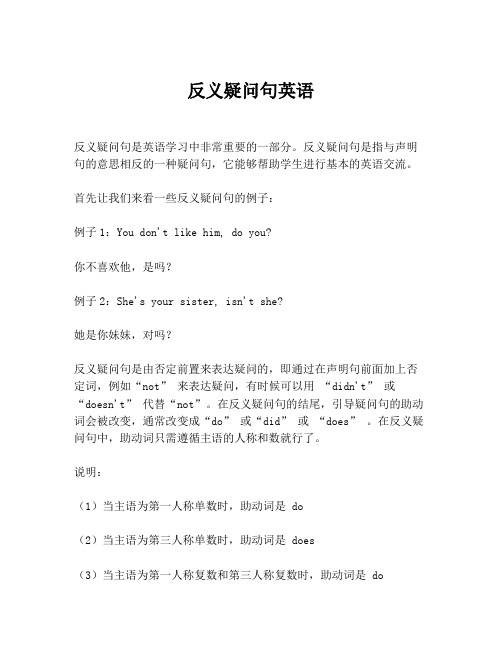
反义疑问句英语反义疑问句是英语学习中非常重要的一部分。
反义疑问句是指与声明句的意思相反的一种疑问句,它能够帮助学生进行基本的英语交流。
首先让我们来看一些反义疑问句的例子:例子1:You don't like him, do you?你不喜欢他,是吗?例子2:She's your sister, isn't she?她是你妹妹,对吗?反义疑问句是由否定前置来表达疑问的,即通过在声明句前面加上否定词,例如“not” 来表达疑问,有时候可以用“didn't” 或“doesn't” 代替“not”。
在反义疑问句的结尾,引导疑问句的助动词会被改变,通常改变成“do” 或“did” 或“does” 。
在反义疑问句中,助动词只需遵循主语的人称和数就行了。
说明:(1)当主语为第一人称单数时,助动词是 do(2)当主语为第三人称单数时,助动词是 does(3)当主语为第一人称复数和第三人称复数时,助动词是 do同时,如果要表达过去否定疑问句,助动词会变成did,所以上面例子1可以改成:You didn't like him, did you?此外,如果要表达虚拟否定疑问句(即虚拟情况的否定疑问句),也可以使用would而不是do来表达。
例如:You wouldn't want to go, would you?你不想去,是吗?至此,我们已经学习了反义疑问句的构成,生活中也可以运用反义疑问句,例如:A:I think you should stay at home tonight.我认为你今晚应该待在家里。
B: But I want to go out and have some fun.但是我想出去玩一下。
A: You don't want to stay at home, do you?你不想呆在家里,是吗?从上文中可以看出,反义疑问句不仅可以让学生掌握基本的英语交流技巧,而且在日常生活中也可以用到,这也是反义疑问句所吸引人的地方。
反义疑问句讲解及答案
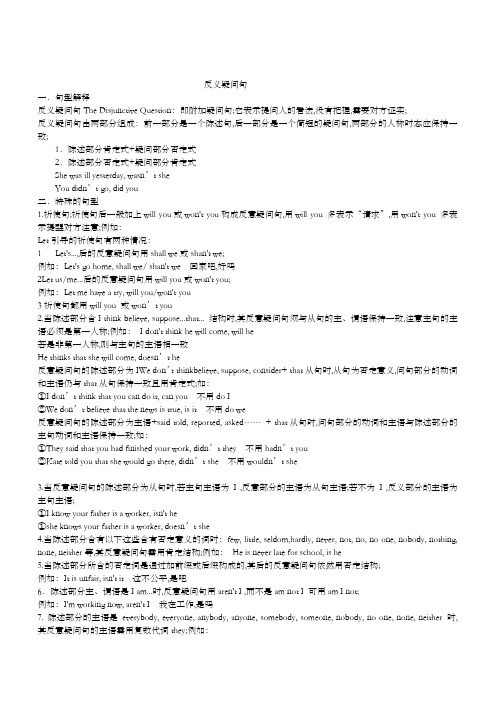
反义疑问句一.句型解释反义疑问句The Disjunctive Question:即附加疑问句;它表示提问人的看法,没有把握,需要对方证实;反义疑问句由两部分组成:前一部分是一个陈述句,后一部分是一个简短的疑问句,两部分的人称时态应保持一致;1.陈述部分肯定式+疑问部分否定式2.陈述部分否定式+疑问部分肯定式She was ill yesterday, wasn’t sheYou didn’t go, did you二.特殊的句型1.祈使句;祈使句后一般加上will you或won't you构成反意疑问句,用will you 多表示“请求”,用won't you 多表示提醒对方注意;例如:Let引导的祈使句有两种情况:1 Let's...,后的反意疑问句用shall we或shan't we;例如:Let's go home, shall we/ shan't we 回家吧,好吗2Let us/me...后的反意疑问句用will you或won't you;例如:Let me have a try, will you/won't you3祈使句都用will you 或won’t you2.当陈述部分含I think believe, suppose...that... 结构时,其反意疑问句须与从句的主、谓语保持一致,注意主句的主语必须是第一人称;例如:I don't think he will come, will he若是非第一人称,则与主句的主语相一致He thinks that she will come, doesn’t he反意疑问句的陈述部分为IWe don’t thinkbelieve, suppose, consider+ that从句时,从句为否定意义,问句部分的动词和主语仍与that从句保持一致且用肯定式;如:①I don’t think that you can do it, can you 不用do I②We don’t believe that the news is true, is it 不用do we反意疑问句的陈述部分为主语+said told, reported, asked……+ that从句时,问句部分的动词和主语与陈述部分的主句动词和主语保持一致;如:①They said that you had finished your work, didn’t they 不用hadn’t you②Kate told you that she would go there, didn’t she 不用wouldn’t she3.当反意疑问句的陈述部分为从句时,若主句主语为I ,反意部分的主语为从句主语;若不为I ,反义部分的主语为主句主语;①I know your father is a worker, isn't he①she knows your father is a worker, doesn’t she4.当陈述部分含有以下这些含有否定意义的词时:few, little, seldom,hardly, never, not, no, no one, nobody, nothing, none, neither等,其反意疑问句需用肯定结构;例如:He is never late for school, is he5.当陈述部分所含的否定词是通过加前缀或后缀构成的,其后的反意疑问句依然用否定结构;例如:It is unfair, isn't it 这不公平,是吧6.陈述部分主、谓语是I am...时,反意疑问句用aren't I ,而不是am not I 可用am I not;例如:I'm working now, aren't I 我在工作,是吗7. 陈述部分的主语是everybody, everyone, anybody, anyone, somebody, someone, nobody, no one, none, neither 时, 其反意疑问句的主语需用复数代词they;例如:Everyone is here, aren't they 大家都到了,是吗No one knows about it, do they 没有人知道这件事,对吗8.陈述部分的主语是everything, nothing, anything或something 时,反意疑问句的主语应用代词it;例如:Something is wrong with my radio, isn't it我的收音机出毛病了,是吧9.陈述部分的主语是指示代词this或that时,反意疑问句的主语用it,当陈述部分的主语是指示代词these或those 时,其反意疑问句的主语用they;例如:This is a plane, isn't it 这是一架飞机,是吗These are grapes,aren't they 这些是葡萄,是吗10.陈述部分的主语是不定代词one时,反意疑问句的主语可以用one,也可用you;例如:One should be ready to help others, shouldn't one每个人都应该乐于助人,是吧11. 当陈述部分谓语动词是need, dare,且这些词被用作实义动词时,其反意疑问句需用do的适当形式;例如:He needs help, doesn't he 他需要帮助,是吗12.当陈述部分主语是从句、不定式短语、动词-ing形式时,反意疑问句的主语应该用it;例如:What you need is more important, isn't it你需要的东西更重要,是吧12.havehas不是表示“有”的意思,并在句中做谓语时,其反意疑问句的助动词要用do, does, did;例如:They had a meeting just now,didn't they他们刚才开了个会,是吗15.陈述部分有have to 时,其反意疑问句要用助动词的否定形式;例如:You have to water the vegetables every day, don't youYou had to water the vegetables every day, didn't you16.He used to stay up late, usedn’t he/ didn’t he17.陈述部分是there be句型时,其反意疑问句中要用there;There was a hospital here, wasn't there18.陈述部分有had better时,反意疑问句中要用hadn't;例如:We’d better go to school at once, hadn't weHe’d rather go home, wouldn’t he19.当陈述部分含有情态动词must时,我们便要分析一下must的含义;如果must 作“一定;要;必须”讲,反意疑问句须用mustn't或needn't;而当must作推测意义“一定是;必定”讲时,反意疑问句则需根据must后的动词原形选用相应的形式;例如:He must work hard at physics, mustn't he他必须努力学物理,是吧Tom must be at home,isn't he 汤姆一定在家,是吧①He might have forgotten his pen in the classroom yesterday, didn’t he不用mightn’t he / hasn’t he②You must have got up late this morning, didn’t you 不用mustn’t you /haven’t you20.反意疑问句的回答用yes, no, 但是,回答意思相反,当陈述部分是否定形式时,回答要按事实;例如:They don’t work hard, do theyYes, they do. 不,他们工作努力;/No, they don’t. 对, 他们工作不努力;反意疑问句的陈述部分为I am……时,问句部分习惯上用aren’t I 表示;如:I am a very honest man, aren’t I反意疑问句练习1. I suppose the shoes will last you at least one year, ____________A. won’t theyB. will theyC. do ID. don’t2. Everyone is surprised at the news, _____________A, is he B. are they C. aren’t they D. is not he3. ----- You will come to have dinner with us, won’t you----- ____________A. Excuse me, I won’t.B. I haven’t been there.C. You are welcome.D. Yes. That’s very nice of you.4. Tom isn’t a hard-working student, for it is the third time he has been late, ______________A. wasn’t itB. hasn’t itC. isn’t itD. hasn’t he5. You don’t have to go school on Sundays, _____________ youA. haveB. doC. shouldD. would6. I don’t think he had his supper at the school, _____________A. had heB. did heC. do ID. don’t you7.I don’t think he’d like to take such a difficult job, __________A. had heB. would heC. do ID. don’t you8. I don’t think her passport’s gone, __________A. is itB. has sheC. do ID. don’t you9. Do pay attention to my work and keep your eyes open all the time, ____________A. will youB. don’t youC. shall weD. won’t we10. All the drivers dislike driving on the narrow roads ________________A. don’t theyB. don’t each of themC. do ID. don’t you11. Let’s go and have a walk,___________A. doB. shallC. haven’tD. shan’t12. Go and fetch a chair for him, ___________A. don’t youB. shall youC. won’t youD. will you13. There used to be a shop behind the factory, ________________A. didn’t thereB. used thereC. usedn’t it C. didn’t it14. I’m sure he must have been sleeping at the moment, __________A. aren’t I B, mustn’t C. wasn’t he D. hasn’t15. I had to tell the truth, __________A. hadn’t IB. wouldn’t IC. didn’t ID. shouldn’t I16.------- Why is Tom absent now-------He must be sick,________________A. isn’t heB. must heC. is heD. mustn’t he17, He’d like to have a look at your picture,_________-heA. hadn’tB. didn’t C .couldn’t D .wouldn’t18. You don’t think he will come,_________A. do youB. will youC. will heD. won’t he19. Let’s go home, shall we _________.A. That’s right.B. That’s allC. That’s all rightD. All right20. Jack had dinner with his mother at home yesterday,A. didB. doesC. didn’tD. hadn’t21. Let John finish the work all by himself,___________A. shall weB. will youC. do youD. do we22.I don’t think it is going to rain, _____________ itA. do IB. do youC. isD. isn’t23. Nothing the boy did was right, _______ itA. wasB. didC. wasn’t C. didn’t24. It’s the first time that she has been to the United States, ____________A. isn’t sheB. isn’t itC. hasn’t sheD. hasn’t it25. He was hardly able to stand on his feet after the car accident,__________ heA. couldB. couldn’tC. wasD. wasn’t26. Jack seldom goes to the park, _______________A. does heB. doesn’t heC. does JackD. doesn’t Jack27. People use tag question 反意疑问because they are not sure of what they have said _____________theyA. doB. didC. didn’tD. don’t28. Everyone wants to be chosen for the work, ____________A. isn’t heB. does heC. don’t theyD. do they29. She is going to see you ,_________ sheA. isn’tB. isC. don’tD. doesn’t30. They used to live in these mountain areas ,_____________ theyA. didB. didn’tC. usedD. weren’t31. He ought to go by plane, _____heA. shouldn’tB. wouldn’tC. shouldD. would32. Lovely weather ___________A. Yes. You are right.B. Yes ,isn’t itC. No, it isD. No, you are wrong33. ---------- You must do as I tell you.----------Oh, I must, ____________IA. shouldB. mustn’tC. oughtD. must34. We must start earlier,__________ weA. needn’tB. mustn’tC. don’tD. mustn’t35. You must have studied English for many years, _________ youA. didn’tB. haven’tC. needn’tD. mustn’t36. She must have arrived there yesterday, __________ sheA. didn’tB. hasn’tC. needn’tD. mustn’t37. We mustn’t be late, __________ weA. mustB. mayC. areD. A&B38, I needn’t show her the keys to the question, ________ IA. mustB. needC. canD. do39. We need to practice speaking English more often, ___________ weA. mustn’tB. needn’tC. can’tD. don’t40. I have to work this afternoon,__________ I A. don’t C, haven’t D. doKEY. 1--10 ACDCB BBAAA 11-20 BDACC ADADC21-30 BCABC ADCAB 31-40 ABDAB ADBDC。
英语反意疑问句

英语反意疑问句反意疑问句是一种特殊的疑问句,其结构为:“陈述句+反意疑问句的转折连接词+反义疑问句”,用于表示对某一观点的质疑或确认。
下面是关于英语反意疑问句的相关内容。
一、反意疑问句的概述反意疑问句是用于询问或肯定对方对陈述的观点的一种问句。
其结构为“陈述句+反意疑问句的转折连接词+反义疑问句”。
反意疑问句的转折连接词有常用的有"but"、"though"、"yet"、"still"等。
反意疑问句一般用于英语口语中,使得对话更加自然流畅。
二、反意疑问句的用法1. 反面认同:对一个肯定的事实提出质疑。
例如:"You went to the party last night, didn't you?"2. 正面疑问:对一个否定的事实提出确认。
例如:"You don't like coffee, do you?"3. 意见确认:对对方的意见进行确认。
例如:"You think it's going to rain today, don't you?"4. 邀请确认:表示邀请的疑问。
例如:"Let's go for a walk, shall we?"三、反意疑问句的语气反意疑问句的语气可以根据情境和语调来调整。
积极的反意疑问句用于表示请求或请求对方的肯定回答,例如:"You'll help me, won't you?" 消极的反意疑问句用于表示期待否定回答或表示对方的斥责,例如:"You didn't do your homework again, didyou?"四、反意疑问句的注意事项1. 反意疑问句通常是在对话中使用,不适用于正式文体。
(完整版)反义疑问句的用法归纳及习题

(完整版)反义疑问句的⽤法归纳及习题反意疑问句【反意疑问句】(⼀)概念:反意疑问句是由陈述句和附在其后的附加疑问句组成。
其中附加疑问句是对陈述句所说的事实或观点提出疑问,起证实作⽤,⼀般⽤于证实说话者所说的事实或观点。
(⼆)要点注意:1、反意疑问句前后两部分谓语应是:“肯定陈述+否定疑问”或“否定陈述+肯定疑问”。
2、简略问句如果是否定式:not应与be,do,will等系动词、助动词、情态动词缩写。
3、简略问句的主语不⽤名词,应⽤⼈称代词。
4、陈述部分含“too...to”时,是否定句。
(三)⽤法:1) 陈述部分I am时,疑问部分要⽤aren't I.I'm as tall as your sister,aren't I?(我和你姐姐⼀样⾼,对吗?)2) 陈述部分⽤no, nothing, nobody, never, few, little, seldom, rarely,hardly等否定含义的词时,疑问部分⽤肯定含义。
如:The old man made no answer, did he?Jim is never late for school, is he?3) 陈述部分有情态动词have to +v. (had to + v.),疑问部分常⽤don't +主语(didn't +主语)。
We have to get there at eight tomorrow, don't we?used to,疑问部分⽤didn't +主语或usedn't +主语。
He used to take pictures there, didn't he? / usedn't he?had better(最好)+ v. 疑问句部分⽤hadn't you?You'd better read it by yourself, hadn't you?4) 陈述部分有would rather(宁可、宁愿)+v.,疑问部分多⽤wouldn't +主语。
反义疑问句(含解析、例句及详尽用法)

反义疑问句(含解析、例句及详尽用法)-CAL-FENGHAI.-(YICAI)-Company One1反义疑问句一、祈使句的反义疑问句1、肯定祈使句Will you/won’t you2、否定祈使句Will you3、Let的祈使句Let us ...,will you(此处Let us 表示“允许我们...”)Let’s...,shall we (此处Let’s表示“让我们...吧”)Let + 第三人称...,will you二、Must的反义疑问句1、表示“必须” musn’t /needn’tEg. You must go now, needn’t you2、表示“不准”Eg. You musn’t smoke here, must/may you3、表示推测,肯定。
(I’m sure + 从句)Eg. You must be hungry now, aren’t youI’m sure you are hungry now, aren’t youShe must have heard about that, hasn’t sheI’m sure you have heard about that, haven’t youYou must have watched that movie last night, didn’t you(last nigh为具体时间点,所以用一般过去式)三、主语(反义疑问句)+从句主句:I(don’t)think/believe/consider/suppose 或 I’m afraid/sure...后跟从句时,可将从句部分进行反义疑问Eg. I don’t think he will win, will heI think he will win, won’t heShe thinks he will win, doesn’t she(当主句主语不是I时不适用于该用法,此句中的翻译疑问针对的是主句而非从句)四、当句中包含有表示否定意义的副词或不定代词时,反义疑问句用肯定形式Eg. Nothing happened to him, did itIt is unfair, isn’t itHe dislikes watching TV, doesn’t he(该句中含否定意义的是动词而非副词或不定代词,因此不适用于该用法,反义疑问句仍然使用否定形式)五、反义疑问句的回答反义疑问句的回答针对被提问部分的谓语动词,且与回答句前部分的Yes和No 保持一致Eg. A: You haven’t lost the ticket, have youB: D I know it’s hard to get another one at this moment.A. Yes, I haven’tB. No, I haveC. I hope soD. I’m afraid not六、陈述部分的主语与反义疑问句主语保持一致的情况1、OneEg. One can’t be too careful when driving a car, can one/he一个人在开车的时候再怎么小心也不为过。
(完整版)英语语法:反义疑问句专项讲解
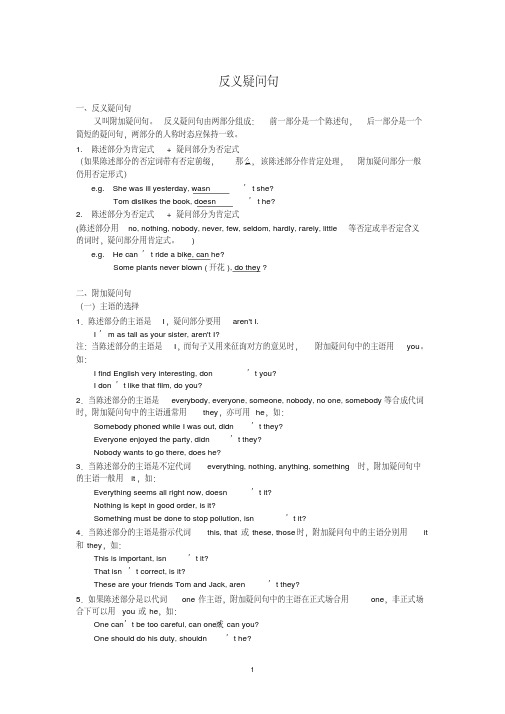
反义疑问句一、反义疑问句又叫附加疑问句。
反义疑问句由两部分组成:前一部分是一个陈述句,后一部分是一个简短的疑问句,两部分的人称时态应保持一致。
1.陈述部分为肯定式+ 疑问部分为否定式(如果陈述部分的否定词带有否定前缀,那么,该陈述部分作肯定处理,附加疑问部分一般仍用否定形式)e.g. She was ill yesterday, wasn’t she?Tom dislikes the book, doesn’t he?2.陈述部分为否定式+ 疑问部分为肯定式(陈述部分用no, nothing, nobody, never, few, seldom, hardly, rarely, little等否定或半否定含义的词时,疑问部分用肯定式。
)e.g. He can’t ride a bike, can he?Some plants never blown (开花), do they ?二、附加疑问句(一)主语的选择1.陈述部分的主语是I,疑问部分要用aren't I.I’m as tall as your sister, aren't I?注:当陈述部分的主语是I,而句子又用来征询对方的意见时,附加疑问句中的主语用you。
如:I find English very interesting, don’t you?I don’t like that film, do you?2.当陈述部分的主语是everybody, everyone, someone, nobody, no one, somebody等合成代词时,附加疑问句中的主语通常用they,亦可用he,如:Somebody phoned while I was out, didn’t they?Everyone enjoyed the party, didn’t they?Nobody wants to go there, does he?3.当陈述部分的主语是不定代词everything, nothing, anything, something时,附加疑问句中的主语一般用it,如:Everything seems all right now, doesn’t it?Nothing is kept in good order, is it?Something must be done to stop pollution, isn’t it?4.当陈述部分的主语是指示代词this, that或these, those时,附加疑问句中的主语分别用it 和they,如:This is important, isn’t it?That isn’t correct, is it?These are your friends Tom and Jack, aren’t they?5.如果陈述部分是以代词one作主语,附加疑问句中的主语在正式场合用one,非正式场合下可以用you或he,如:One can’t be too careful, can one?或can you?One should do his duty, shouldn’t he?6.当陈述句为there be结构时,附加疑问句中的主语也用there。
英语反义疑问句最全解析

反义疑问句1)“am I”的否定形式是“aren’t I”,而不是“am not I”或“amn’t I”。
例如:I am right, aren’t I?2)everything和nothing作为陈述句的主语时是单数,因此反意疑问句中的主语要用“it”。
注意,nothing作为主语时,反意疑问句中的动词要用肯定形式。
例如:Nothing is wrong, is it?3)陈述句中的主语为everyone, everybody, anyone, nobody或no one时,反意疑问句中的主语用they。
注意,nobody和no one是否定词,因此反意疑问句应该用肯定的。
例如:Nobody knows it, do they?4)如果陈述句部分有no, never, hardly, scarcely, rarely, seldom等词,那么,陈述句本身就是否定的,所以要接一个肯定的反意疑问句。
例如:He has never been there, has he?5)如果陈述句中的动词是“wish”,那么反意疑问句中要用“may”。
例如:I wish to go there with you, may I?6)包括听话人在内时“let’s”的反意疑问句要用“shall we”。
反之,反意疑问句中要用“will you”。
例如:Let’s go, shall we?Let us go, will you?全真模拟试题1. All of the plants now farmed on a large scale were developed from plants ____ wild.A. that once growB. once they growC. they once grewD. once grew2. By the time you graduate, we ____ in Australia for one year.A. will be stayingB. will have stayedC. would have stayedD. have stayed3. He appreciated ____ the chance to deliver his thesis in the annual symposium on Comparative Literature.A. having givenB. to have been givenC. to have givenD. having been given4. The government official can hardly find sufficient grounds ____his arguments in favor of the revision of the tax law.A. on which to baseB. which to be based onC. to base on whichD. on which to be based5. Living in the desert involves a lot of problems, ____water shortage is the worst.A. not to mentionB. of whichC. let aloneD. for what6. Hydrogen is one of the most important element in the universe ____ it provides the building blocks from which the other elementsare produced.A.so thatB. but thatC. provided thatD. in that7. Just as relaxation is an important part of our lives, ____stress.A.so isB. as it isC. and so isD. the same is8. Victor took a bus and headed for home, ____ if his wife would have him back.A. not to knowB. not knownC. not knowingD. not having known9. We can make an exception ____.A. in any case of JohnB. in case of JohnC. in case of John’sD. in the case of John10. When the Cultural Revolution was launched in China, his father ______ college.A. attendedB. had been attendingC. was attendingD. has been attending11. My cat is a fussy eater, but my dog is so ____ that she’ll swallow down anything that is put in front of her.A. indiscriminateB. choosyC. indefiniteD. picky12. “This house is more ____than the federal government!” Mac complained to his parents. “You have rules for everything.”A. systematicB. democraticC. bureaucraticD. public试题答案与解析1. A)【句意】大规模种植的农作物都繁衍于野生植物。
反义疑问句

特殊的反义疑问句1.Sit down and have a cup of tea ,will you? \ won't you ?Don't be late again, will you ?2.Let's have a rest, shall we? \ shan't we? \ OK?Let us go home now, will you? \won't you?Let meLet him3.What a beautiful girl ,isn't she ?4.I'm quite tall, aren't I?5.Something is wrong with my radio, isn't it?Nothing is serious, is it ?6.Everybody likes Beijing, don't they?Nobody wants to go swimming , does he ? \ do thay ?Neither of them is right, is he ? \ are they ?7.This is my ruler, isn't it ?Those are their books , aren't they ?8.One should do one's duty, shouldn't one?One cannot always do one's duty , can you ?9.What you need is more practice, isn't it ?To learn English well isn't easy ,is it ?Swimming is great fun, isn't it ?10.I wish to go home ,may I ?I wish I were you , may I ?11.He said that it was worth doing ,didn't he ?She said that her father had gone to America , didn't she ?I think he will be back in an hour , won't he ?I don't suppose you are serious , are you ?12.We must study English hard or we can't be good at it , can we ?He is a teacher but his wife is a nurse , isn't she ?13 当must 表示“必须”时,He must work hard next term , mustn't he ?当must 表示“必要”时,They must renew the books , needn't they ?当must 表示“推测”时,She must be very tired , isn't she ?You must have been to Huangshan ,haven't you ?14.You'd better come back early ,hadn't you ? \ shouldn't you ?You'd like to go there , wouldn't you ?You'd rather15.--Tom told me he saw a ghost last night ?-- He did , did he ?-- You mustn't listen to his story .-- Oh , I mustn't , mustn't I ?主谓一致一,谓语动词用单数1.either, neither ,one ,each (of) ,every (of) ,作主语或修饰主语时E.g. Every silver knife ,fork ,spoon has to be counted .2. everybody ,everyone ,everything ,no one ,no body ,anyone等不定代词,what ,whoever 等作主语3.不定式,动名词,从句作主语时谓语动词单数To see is to believe .Singing and dancing are their greatest pleasure .4.国家,机构,书刊,事件名称等作主语:The United Nations was founded in 1945.5.并列主语指同一事物时Ice cream and cake is what she wants after dinner .6.many a + 单数名词(表示许多)Many a student wants to apply for the scholarship .7.mathematics ,measles ,physics ,politics ,news二.谓语动词用复数1.both, few, many, several ,a number of ,the majority of 作主语或修饰主语2.用and 或both...and...连接的两个不同事物The manager and the secretary of the firm are very able man .The editor and publisher of the newspaper is a very able man .3.某些集合名词:few ,people ,the rest ,cattle ,police 等作主语4.正式语中,one of those + 复数名词+ 定从(谓语复数) Jane is one of those persons who always think they are right.the only one of +单数名词+ 定从(谓语单数)三.谓语动词有时单数有时复数1.a good many ,a number of + 复数名词a good deal + U2.family ,army ,class ,crowd ,herd ,public ,group, party ,committee, company ,government ,team等表整体--单数表成员--复数Class 2 is having English class . Class 2 are playing on the sports ground.3.Chinese ,Japanese ,English , French 指语言-- 单数指人民-- 复数4.时间,金钱,距离,体积等作主语---V.单数Twenty dollars is too expensive .表具体的、个别的单位--复数The last two years have been very difficult for us .真题1.In the coming summer holidays,my family ___ going to take a one-week trip to Qingdao.A.isB.areC.wasD.were2.___ pretty your dress is !Where did you get it ?A.HowB.How aC.WhatD.What a3.--There is enough food for the birds ,isn't ____?--No. We need to get some.A.itB.thereC.thatD.this4.--Your monitor id never late for school , is he ?--____.He always comes to school earlier than others .A.Yes ,he is .B.No,he isn'tC.Yes,of courseD.No,sometimes5.--_____ ?--He thinks China is great .A.What does your father think of China ?B.What does your father like in China ?C.Does your father like China ?6.--The film "Hoot"(拯救猫头鹰)is on at the movies .Let's go to see it ,____?--Ok. Let's go .A.will youB.shall weC.won;t weD.don;t you7.Lily is away .She ,with her mother ,____ to Zhalong to see birds .A.has goneB.have goneC.has been8.-- How many teachers are there in your school ?-- About 200. One third of them ___ men teachers.A.haveB.hasC.areD.is9.In our school library there ___a number of books on science and the number of them___growing larger and larger .A.is; areB.are; isC.has ;isD.have ;are10.Nothing is difficult in the world if you put your heart into it ,_____?A.aren't theyB.isn't itC.are theyD.is it。
反义疑问句

结构二: 前否,+ 后肯
陈述部分用 no, nothing, nobody, never, few, seldom, hardly, little等否定含义的词时,疑 问部分用肯定含义。例如: Some plants never blown (开花), do they ? 有些植物从不开花,对吗?
1. You are an actor, ___a_r_e_n_’t_ _y_o_u__ ? 2. He is a good boy, ___i_s_n_’t__ __h_e___ ? 3. It was fine yesterday, _w__a_s_n_’t_ _it__ ?
3
行为动词:助动词/情态动词的否定形式+
Let us ---------, will you ?或won't you ?(Let us 不包括谈话的对方在内)。。。
6. Sit down please, _w__il_l _/_w__o_n_’t_y_o_u__ ? 7. Let’s go home, __w_i_ll_/__w_o_n_’_t_y_o_u__ ? 8. Let us go home, _s_h_a_ll_/__sh__a_n_’t_w__e__
结构二: 前否,+ 后肯
1. You aren’t an actor, __a_r_e__yo_u___ ? 2. It wasn’t fine yesterday, _w__a_s __it__ ? 3. Don’t smoke, ___w__il_l_ y_o_u___ ? 4. You won’t go to USA, _w_i_ll___y_o_u__?
反义疑问句
反意疑问句是由一个陈述句加一个简短的反问
- 1、下载文档前请自行甄别文档内容的完整性,平台不提供额外的编辑、内容补充、找答案等附加服务。
- 2、"仅部分预览"的文档,不可在线预览部分如存在完整性等问题,可反馈申请退款(可完整预览的文档不适用该条件!)。
- 3、如文档侵犯您的权益,请联系客服反馈,我们会尽快为您处理(人工客服工作时间:9:00-18:30)。
反义疑问句
1.当陈述部分的主语是:等everyone, everybody, someone, no one, nobody, somebody合成代词时,附加疑问句的主语非正式文体中往往they用。
(也可以按语法一致原则用单数。
)
Everyone enjoyed the party, didn’t they?
Everybody knows what he has to do, doesn’t he?
2.当陈述部分以one不定代词做主语时,附加问句的主语在正式常场用one,非正式场合用he/you。
ne can’t be too careful,
3.当陈述部分的主语是不定式、动名词、从句、this或that,附加疑问句的主语用it。
(是those, these则用they)
4.当陈述部分的主语是表示物的不定代词everything, anything, nothing等,附加问句的主语用it。
Nothing could make me give it up, could it?
5.陈述部分带有否定词或半否定词,例如:never, hardly, scarcely, seldom, no, none, no one, rarely, nowhere, nothing, nobody, few, little等,附加疑问句的动词要用肯定形式。
+Bob rarely got drunk, did he?
+She seldom goes to the cinema, does she?
6.如果陈述部分中的否定词仅带有否定的前缀或后缀,那么该陈述句应作肯定句处理,附加疑问句应用否定形式。
+He was unsuccessful, wasn’t he?
7.当陈述部分是there be 存在句型时,附加疑问句的主语也用there。
–There’s no help for it, is there?
–There is something wrong, isn’t there?
8.感叹句的附加疑问句,其谓语要求用否定句。
9.祈使句后面的附加疑问句问题
A) 祈使句是否定形式,附加疑问句只能用will you。
B) 祈使句是肯定形式,附加疑问句用肯定、否定均可。
C) Let开头的祈使句要注意:
1.Let’s 在意义上包含谈话的对方在内,表示提出建议或征求对方意见,其反意疑问句往往用shall we。
2. Let us 在意义上一般不包含谈话的对方在内,表示请求对方允许做某事的含义,let 有allow的意思。
附加疑问部分用will you。
3. Let me 开头表示请求,附加疑问句用will you,或用may I。
10.当陈述部分是一个(带that引导宾语从句的)主从复合句时,附加疑问句的主谓要和主句的主谓保持对应关系。
–You think you are funny, don’t you?
+但是,当陈述部分的主语是:I suppose, I think, I believe, I imagine, I expect等结构时,附加疑问句的主语和谓语要和从句的主语,谓语保持一致关系。
而且要注意到否定的转移问题。
–I don’t think (that) she cares, does she?
11.当陈述部分是I’m sure that,;we are sure;I’m afraid that;We are sure that;I feel sure that 等后面跟宾语从句时,反意疑问句与后面的宾语从句一致。
12.当陈述部分是并列句时,附加疑问句的主谓语要和离它最近的句子的主谓保持对应关系。
13.陈述部分中有have一词,且表示“所有”含义时,附加疑问句部分既可用have也可用do。
–You have a Rolls-Royce, haven’t you/don’t you?
14.陈述部分中有have to,附加疑问句部分用do。
15.含有ought to 的反意疑问句,陈述部分是肯定的,疑问部分用shouldn't / oughtn't +主语。
He ought to know what to do, oughtn't he? / shouldn't he?
–The child ought to be punished, oughtn’t he?
–We ought to go there, shouldn’t we?
16.陈述部分有used to,附加疑问句部分可用used 也可以用did 。
–The Allens used to live in the country, usedn’t they?
–He used to smoke fifty cigarettes a day, didn’t he?
17.陈述部分有needn’t时,附加疑问句部分用need但有时也可用must。
–You needn’t go yet, need you?
–He needn’t do that, must he?
18.陈述部分有must,且表示“必须”时,附加疑问句部分用mustn’t,如果表示“必要”则用needn’t。
19.陈述部分中是mustn’t表示“禁止”时,附加疑问句部分用must。
陈述部分中的must表示“一定”、“想必”等推测意义时,附加疑问句部分而是根据陈述部分的谓语动词或其助动词来定。
20.陈述部分是I wish,表示询问或征求意见,附加疑问部分用may I。
21.弄清陈述句中的’d rather = would rather;’d better = had better附加疑问句部分前者用would,后者用had。
